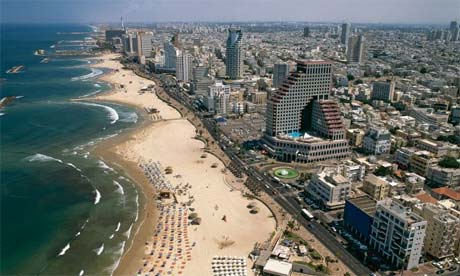Before coming to Israel, everyone I spoke to raved about Tel Aviv. Oh, you’ll love it there, It’s such a hip city, and so on and so forth. All this was music to my ears, except when I remembered that I’d actually be living about 100 kilometers east in the very austere and very un-hip Jerusalem.

Yet after spending two weeks in Israel’s version of Sin City (that is, the one with the beach, the strip clubs, the all-night dance parties, and not, conversely, tens of thousands of Haredim), I understand the appeal. Tel Aviv is a bustling, beachside city filled with Israel’s young and beautiful. The city rises almost in defiance of its desert surroundings, an oasis amidst the barren, sun-drenched land. The beaches are pristine, the women are beautiful, and the drinks flow all night.
But like most welcome sights in the desert, it’s too good to be true (and in the case of the libations, too expensive). Indeed, Tel Aviv is little more than a delusion, her inhabitants accordingly delusional.
Here, in the most hotly contested territory in the world, sits idyllic Tel Aviv. Towering shopping malls dot the landscape, fine boutiques line Sheinkin and Dizengoff Street, and the city’s denizens, in between sips of cappuccino, soak up the sun, talking and laughing. True, the delusion is interrupted periodically by the occasional soldier, but even then only momentarily. For on further inspection, looking beyond the divisional lapels or the cargo pants tucked loosely into the military issue boots, you see the sunglasses: the Ray-Bans, the Dolce & Gabbanas, the Armanis. You don’t need me to tell you that this is no ordinary army.
In many ways, Tel Aviv is like Apartheid-era Cape Town – warm, beautiful, and altogether agreeable.

But on scratching the surface, a different picture reveals itself. Like Cape Town, this city, and the nation as a whole, hides its problems, forces them out, and goes on living in delightful oblivion, still building their monuments to consumerism, still frequenting their favorite shops, and still smiling as they sip their coffee and bask in the warm, February sun.
Meanwhile, further down the coast, a million people live in abject poverty. Gazans, their land polluted to the point of infertility, their foreign benefactors unable to get even the most meager rations past the Israeli blockade, suffer endlessly. And there, in a climate identical to Tel Aviv’s, the people do sit and share a pot of coffee, though knowing and acutely feeling with every inch of their being the direness of their situation. And there, I assure you, the soldiers couldn’t care less what it says on the side of their sunglasses.
Sam Melamed is a Masa participant, participating in Career Israel, one of Masa Israel‘s 160 programs.

